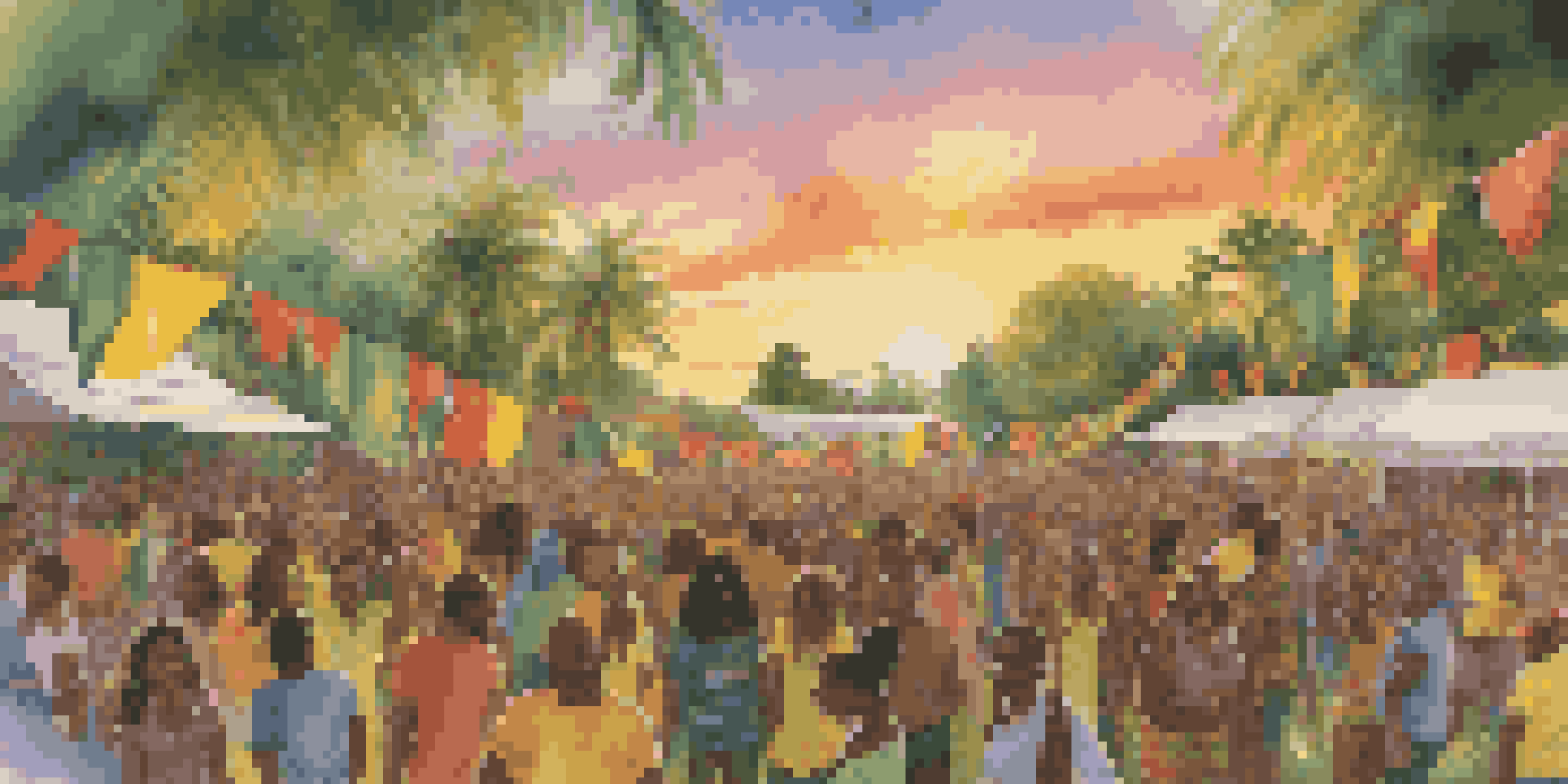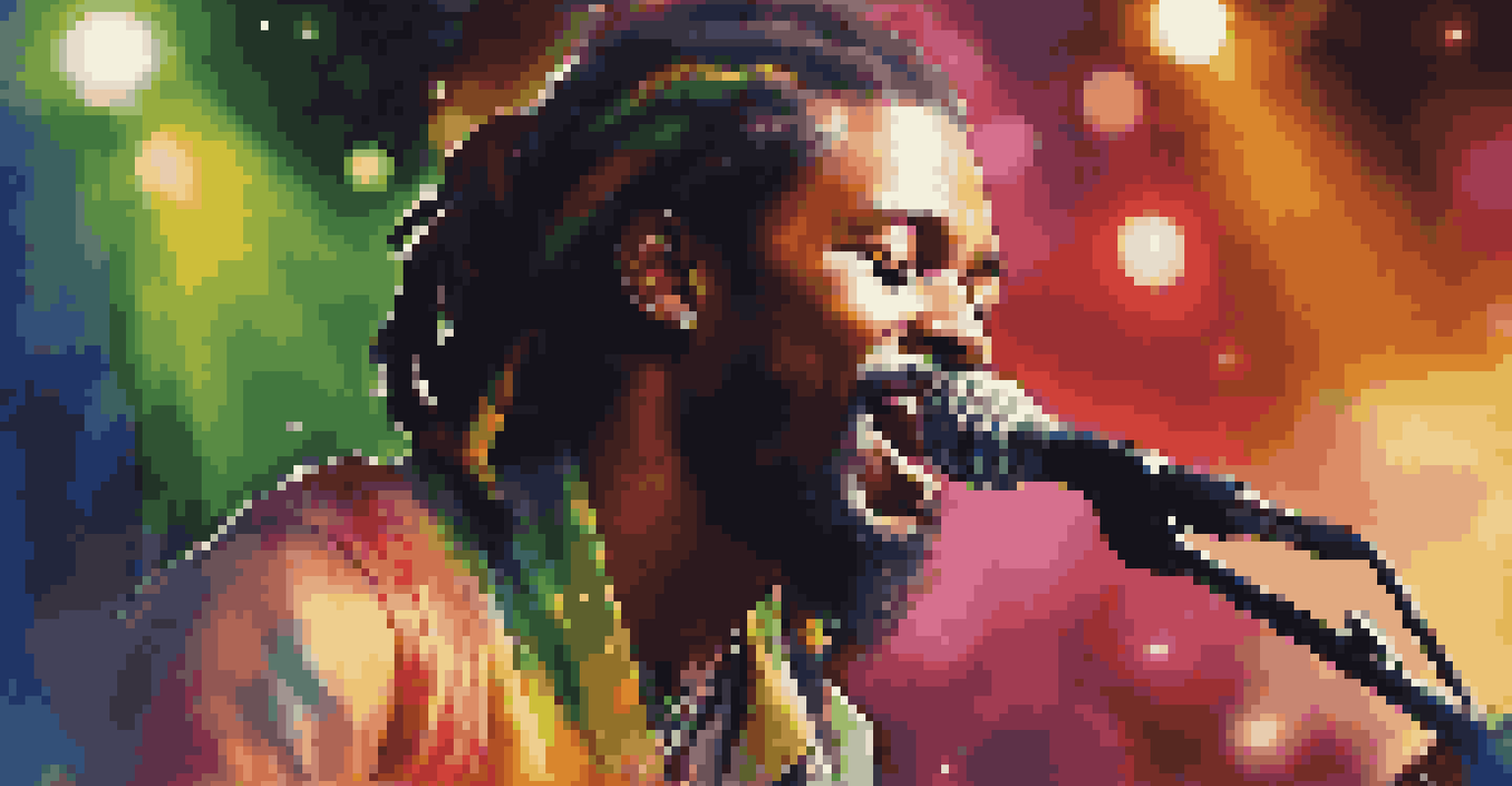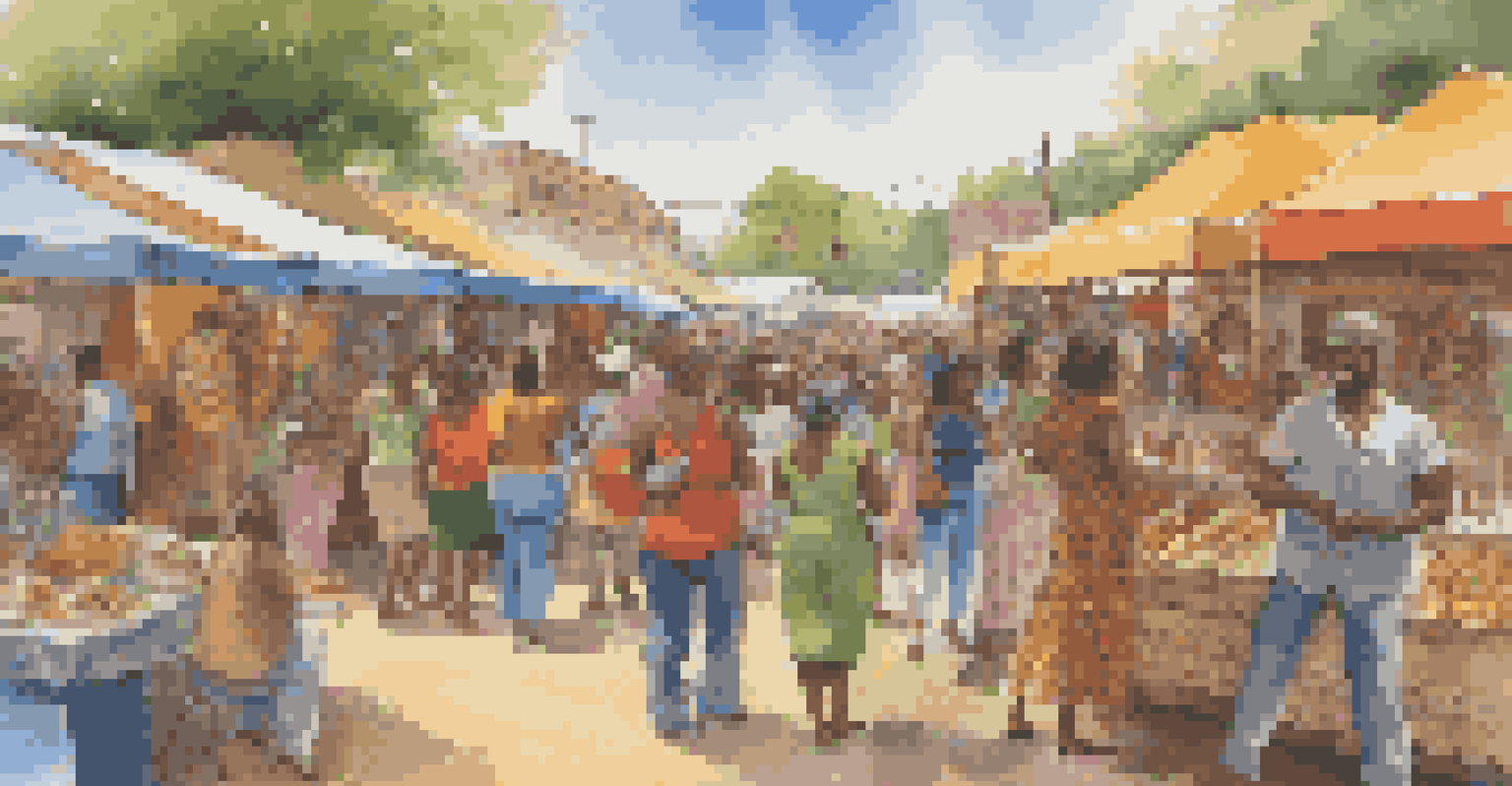The Global Reach of Reggae Festivals and Their Impact

The Origins of Reggae Festivals and Their Evolution
Reggae music, born in Jamaica in the late 1960s, has evolved into a global phenomenon. Festivals celebrating reggae music began to emerge in the 1970s, with the iconic Reggae Sunsplash paving the way. These festivals not only showcased artists but also promoted Jamaican culture and its rich history, establishing a template for future events worldwide.
One good thing about music, when it hits you, you feel no pain.
Over the decades, reggae festivals have adapted to changing musical landscapes while preserving their roots. They now feature a blend of traditional reggae, dancehall, and even fusion genres, attracting diverse audiences. This evolution reflects the genre's ability to resonate with people from various backgrounds, creating a sense of community around shared love for music.
As reggae festivals spread beyond Jamaica, they have also taken on local flavors, incorporating regional artists and cultural elements. This fusion enriches the festival experience and draws in attendees who may not have a deep connection to reggae but appreciate the communal atmosphere and the celebration of diversity.
The Global Popularity of Reggae Festivals
Today, reggae festivals are held in numerous countries, from Europe to Asia, showcasing the genre's far-reaching appeal. Events like the Rototom Sunsplash in Spain and Reggae Festival in Australia highlight how reggae has become a universal language of peace and love. This global popularity has transformed local festivals into international attractions, drawing fans from around the world.

The rise of social media has played a crucial role in spreading reggae’s influence. Fans can now discover festivals and artists online, leading to increased attendance and support for reggae music. This digital exposure fosters a sense of belonging for fans, who connect with others who share their passion, no matter where they are in the world.
Reggae Festivals Foster Community
Reggae festivals create a sense of belonging by bringing together diverse groups to celebrate music and culture.
As reggae continues to gain traction, many festivals are now incorporating various genres, attracting an even broader audience. This cross-pollination of music styles not only enriches the reggae experience but also fosters collaboration among artists, ultimately expanding the reach and impact of the genre.
Economic Impact of Reggae Festivals
Reggae festivals contribute significantly to local economies, providing jobs and boosting tourism. Festivals often attract thousands of attendees, which helps local businesses thrive, from hotels to restaurants. The influx of visitors creates a vibrant economic ecosystem that benefits the entire community.
Reggae is not just music; it's a way of life.
Moreover, these festivals can generate substantial revenue through ticket sales, merchandise, and sponsorships. Local governments often recognize the potential economic impact, leading to support for such events through permits and promotion. This symbiotic relationship between festivals and the community creates a win-win situation for both parties.
In addition to direct economic benefits, reggae festivals often promote cultural tourism, attracting visitors interested in experiencing Jamaican culture firsthand. This interest can lead to year-round tourism, with visitors returning to explore more of the local culture and heritage long after the festival ends.
Cultural Exchange and Community Building
Reggae festivals serve as platforms for cultural exchange, bringing together diverse groups of people who share a love for music. Attendees experience not only the music but also dance, art, and food representative of Jamaican and other cultures. This exchange fosters understanding and appreciation among different communities, breaking down barriers and promoting unity.
The sense of community at these festivals transcends geographical boundaries. People from various backgrounds come together to celebrate, often forming friendships that last beyond the event. This communal spirit creates a safe space for self-expression, where attendees can freely share their stories and experiences through the lens of reggae.
Economic Boost from Festivals
These events significantly contribute to local economies by attracting tourism and supporting local businesses.
Furthermore, many reggae festivals promote social causes, addressing issues such as inequality and environmental sustainability. By raising awareness through music and cultural activities, these festivals inspire attendees to engage with these important topics, fostering a culture of activism and social responsibility.
Reggae Music as a Tool for Social Change
The roots of reggae are deeply intertwined with social and political activism, making the genre a powerful tool for change. Many reggae festivals highlight artists who address social issues through their music, using the platform to raise awareness and inspire action. This tradition continues today, with artists using their voices to advocate for justice, equality, and peace.
Through performances and workshops, reggae festivals can educate attendees about pressing social issues. Many festivals include panels and discussions led by activists and musicians, providing insights into the struggles faced by marginalized communities. This educational component empowers attendees to take action in their own lives and communities.
By harnessing the power of music, reggae festivals encourage a culture of empathy and understanding. The emotive nature of reggae lyrics resonates with listeners, prompting them to reflect on their own experiences and the world around them. This connection can lead to meaningful conversations and initiatives aimed at making a positive impact.
The Role of Technology in Reggae Festivals
Technology has transformed how reggae festivals are experienced, from ticketing to live streaming performances. Attendees can now purchase tickets online and stay updated through social media, enhancing their festival experience. This accessibility has made it easier for fans to engage with their favorite artists and the festival community.
Live streaming has emerged as a game-changer, allowing fans unable to attend in person to experience the festival from anywhere. This digital connection broadens the reach of reggae music, introducing new listeners to the genre. As a result, artists gain exposure, and festivals can attract a more diverse audience.
Reggae as a Social Change Tool
The genre serves as a powerful platform for activism, raising awareness on social issues through music and cultural exchange.
Additionally, technology has enabled more interactive experiences at festivals, such as virtual reality and mobile apps that enhance engagement. Attendees can access schedules, artist info, and interact with other fans in real-time. These innovations not only improve the festival experience but also ensure that reggae continues to thrive in a digital age.
The Future of Reggae Festivals
As reggae music continues to evolve, so too will the festivals that celebrate it. We can expect to see more innovative formats, such as hybrid festivals that combine in-person and virtual experiences. This flexibility will allow for greater inclusivity, enabling fans from all walks of life to participate in the reggae community.
Furthermore, the integration of diverse musical influences will continue to shape the future of reggae festivals. Collaborations with artists from various genres will not only keep the music fresh but also attract new audiences. This dynamic evolution is a testament to reggae's resilience and its ability to adapt to the changing musical landscape.

Ultimately, the future of reggae festivals lies in their commitment to fostering community and cultural exchange. By prioritizing inclusivity and social responsibility, these events will continue to resonate with audiences around the world, ensuring that the spirit of reggae remains vibrant and impactful for generations to come.